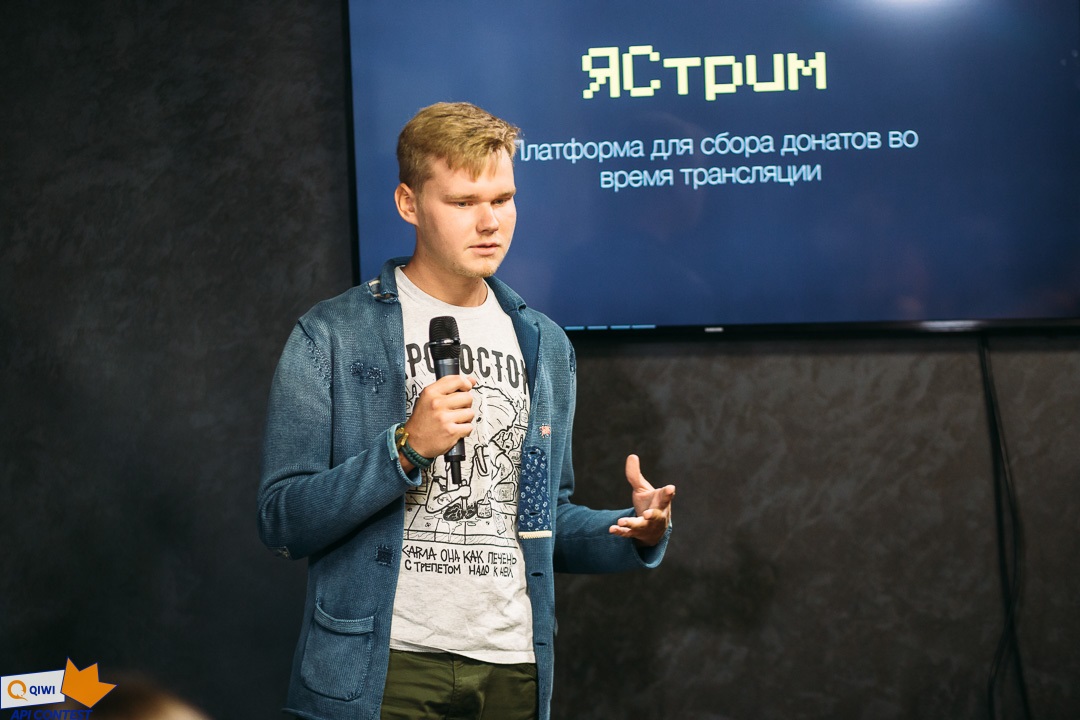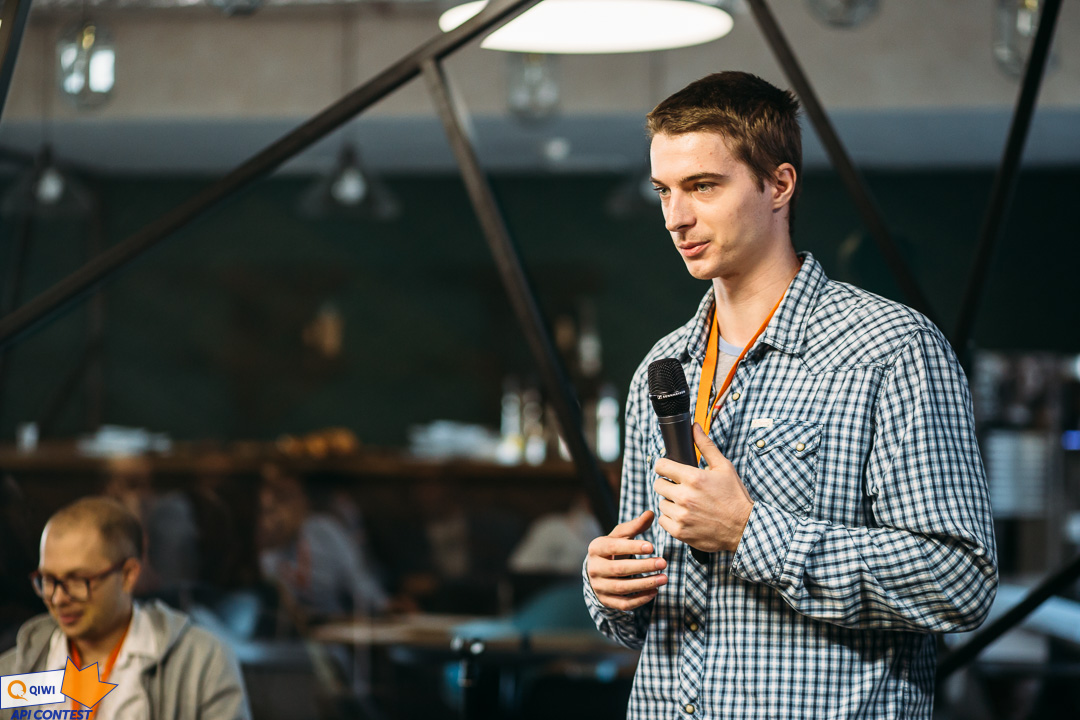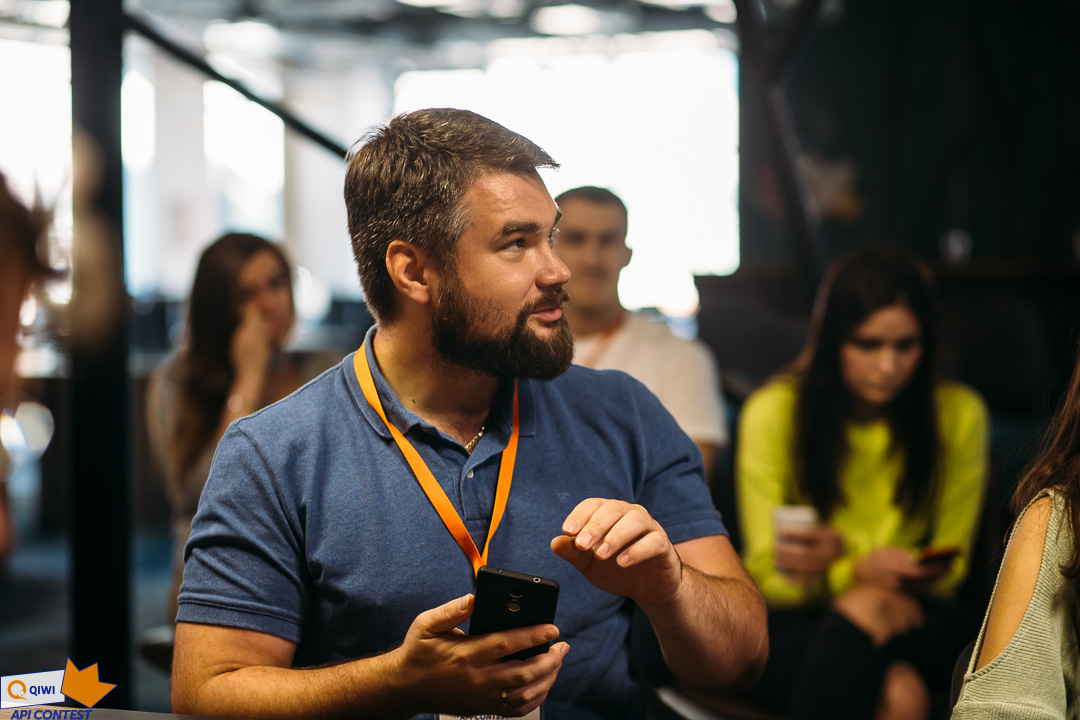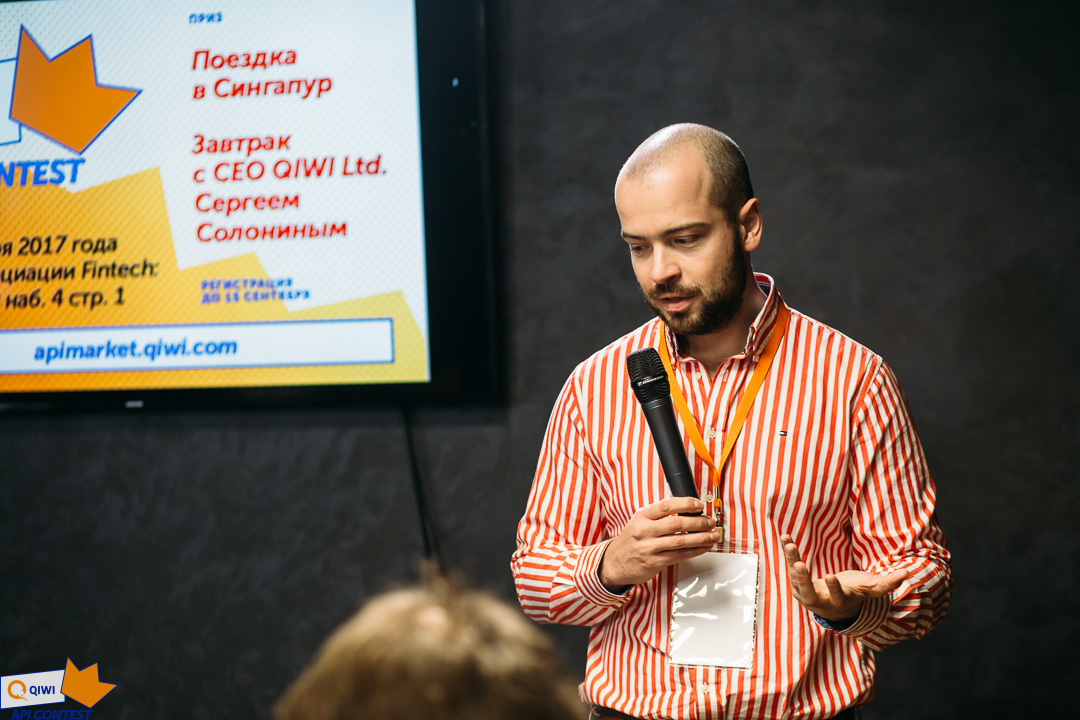Donates to streamers and real money for unreal life: summed up the QIWI API Contest
The current value rule says: "The value of any platform for users is determined by the number of applications written for it." Therefore, having laid out the QIWI Wallet with new authentication API in August of this year, we didn’t postpone engaging the audience in the creative process of creating applications indefinitely, and held the September contest of the QIWI API Contest , in which even Habr himself participated.

QIWI API Contest Finalists and Jury Members
Of the 20 prototypes we received, we selected the 6 best teams in the final. And then we chose two projects that earned ours such different, but in their own way wonderful prizes: a trip to the Fintech festival in Banana-Lemon Singapore and a personal acquaintance with the founder and CEO of QIWI company Sergei Solonin.
We did not choose the winners alone: Oleg Dronov from the AD.ru foundation and Nigar Mardaliev from SkyEng helped us a lot, who together with us looked through all the presentations, asked questions and helped us with the choice of winners, for which we thank them very much.
')
As a result, the prize trip to the Singapore FinTech Festival was received by the team of Maxim diakov2100 Dyakova, Alexander Naumov, Alexander Kobrin and Javid Khalilov with the project “YStream” - a service for processing donates on stream.
We chose their project because:

Alexander Naumov
In addition, the project has the potential of international scaling, so it is important to communicate with the foremost people in the fintech industry at Fintech Festival 2017. That is why we decided that one of the team members should go to Singapore.

Bonus breakfast with CEO QIWI Ltd. Sergey Solonin went to Sergey serjeyX Desyatsky for the QIWI LIFE SIMULATOR project.
He proposed the project of a mobile game "second life". The game is a simulator, affecting various life situations. For example, it simulates the purchase of food, apartment or car for commuting. As in real life, in the game you need to learn, work, in order to provide an acceptable level of comfort; in the case of a lack of which you will lose health, and ultimately lose.

Sergey Desyatsky
A key feature of the application is its integration with the player's QIWI wallet, which is that each top-up balance will be increased tenfold and will be available for spending in the game store. On the one hand, the game does not force the donate, as usual, but on the other hand, it gives another reason to use the QIWI Wallet. This idea is also more than just gamification: we saw the potential in it, as well as to increase financial literacy, as well as financial management with game mechanics. That is why we considered the project of Sergey extremely original, and he also became a winner.

Also within the framework of the final, the team consisting of Sergey Mashkovtsev , Kirill Danilov and Maria Danilova presented “Payment Calendar” - an integrated solution based on the Google Calendar API and QIWI Wallet. Now in the calendar with meetings and plans the opportunity to create events related to payments. The calendar will not allow you to forget something to pay or make a money transfer. As a rule, many now have a calendar “for everything at once”, so this is a more convenient solution than keeping a payment calendar in the interface of each financial service.
Alexander Desyatov taught the iPhone to understand voice commands - to check the balance of the wallet, pay for the cellular phone and transfer money. This option appeared relatively recently in iOS 11 - now Siri can interact not only with native Apple applications, but also written by third-party developers. Alexander managed to create an SDK - an already finished piece of the program that other developers can integrate into their applications. Of course, the jury of the competition had questions about the security of such a service - but there is an opportunity to launch voice commands only after unlocking the phone.

Igor Golenastov presented a prototype for the integration of a payment solution based on cryptocurrency and payments for a mobile phone. And the miners sometimes run out of money on the balance of the phone. The conclusion of such a decision from the test of use in the military, of course, requires the study of the legal scheme.
Andrei Krylosov presented the idea of financial motivation of children through a service for interacting with parents. For example, a child can get pocket money if he studies well or does housework.

It should be noted that we saw interesting ideas and their implementation both among the participants of the QIWI API Contest itself, and at the stage of the “competition of ideas” . Unfortunately, some worthy ideas did not reach the final, but still they are worthy of mention.
For example, the idea of the service of automation of small payments through the QIWI Wallet API, with cross-checking the result through the API of other services. Or the idea of paying for SMM users in social networks or on other sites.
It is also important to note that in half of the decisions of the final part of the competition, problems related to children, their parents and finances were touched upon. Among modern parents and children, modern automated methods of money transfer are in demand. Using the QIWI Wallet API, children can better understand the function and value of money, and parents can raise children (encourage or penalize).
In general, the given topic “automate your wallet” did not particularly inspire developers. They were more interested in OAuth access to the wallets of end users to their applications. Even the ban on copying tokens wallet_API from the qiwi.com/api interface to the application interface of the bidder did not help. It's like a sign “not to walk on lawns” - many, seeing such an inscription, just want to walk on the lawn and still lie on it.

Why did we even introduce such restrictive conditions? Developing a secure token release process for third-party applications is one of the priorities for the QIWI Wallet, and we could not ignore this aspect during the QIWI API Contest. As a result, the necessary decisions were not very many and, unfortunately, those who understood all the limitations of the conditions of the competition could not present a working product.
Also, the complexity has increased what was required at the same time to present the idea and develop its prototype. That is why we held a “competition of ideas” to somehow stimulate the developers and give them food for thought. As conclusions, we have learned the following for ourselves: in order to get a good implementation, you need to cut the topic and range of use of the QIWI Wallet API.
And for those who prefer to see once, we have prepared a summary video about how the QIWI API Contest took place and passed:

QIWI API Contest Finalists and Jury Members
Of the 20 prototypes we received, we selected the 6 best teams in the final. And then we chose two projects that earned ours such different, but in their own way wonderful prizes: a trip to the Fintech festival in Banana-Lemon Singapore and a personal acquaintance with the founder and CEO of QIWI company Sergei Solonin.
We did not choose the winners alone: Oleg Dronov from the AD.ru foundation and Nigar Mardaliev from SkyEng helped us a lot, who together with us looked through all the presentations, asked questions and helped us with the choice of winners, for which we thank them very much.
')
As a result, the prize trip to the Singapore FinTech Festival was received by the team of Maxim diakov2100 Dyakova, Alexander Naumov, Alexander Kobrin and Javid Khalilov with the project “YStream” - a service for processing donates on stream.
We chose their project because:
- the presented product is well developed (presence of applications for Windows and Mac, separate for tape drive, mobile application and web form for the viewer);
- good understanding of the target audience and product issues;
- the quality of the presentation of ideas at the final part of the competition;
- Selection of suitable QIWI Wallet API methods for user tasks;
- YouTube is a new TV, and streamers are new TV hosts. Choosing a promising direction with a long-term trend of interest growth.

Alexander Naumov
In addition, the project has the potential of international scaling, so it is important to communicate with the foremost people in the fintech industry at Fintech Festival 2017. That is why we decided that one of the team members should go to Singapore.

Bonus breakfast with CEO QIWI Ltd. Sergey Solonin went to Sergey serjeyX Desyatsky for the QIWI LIFE SIMULATOR project.
He proposed the project of a mobile game "second life". The game is a simulator, affecting various life situations. For example, it simulates the purchase of food, apartment or car for commuting. As in real life, in the game you need to learn, work, in order to provide an acceptable level of comfort; in the case of a lack of which you will lose health, and ultimately lose.

Sergey Desyatsky
A key feature of the application is its integration with the player's QIWI wallet, which is that each top-up balance will be increased tenfold and will be available for spending in the game store. On the one hand, the game does not force the donate, as usual, but on the other hand, it gives another reason to use the QIWI Wallet. This idea is also more than just gamification: we saw the potential in it, as well as to increase financial literacy, as well as financial management with game mechanics. That is why we considered the project of Sergey extremely original, and he also became a winner.

Honorable Mentions
Also within the framework of the final, the team consisting of Sergey Mashkovtsev , Kirill Danilov and Maria Danilova presented “Payment Calendar” - an integrated solution based on the Google Calendar API and QIWI Wallet. Now in the calendar with meetings and plans the opportunity to create events related to payments. The calendar will not allow you to forget something to pay or make a money transfer. As a rule, many now have a calendar “for everything at once”, so this is a more convenient solution than keeping a payment calendar in the interface of each financial service.
Alexander Desyatov taught the iPhone to understand voice commands - to check the balance of the wallet, pay for the cellular phone and transfer money. This option appeared relatively recently in iOS 11 - now Siri can interact not only with native Apple applications, but also written by third-party developers. Alexander managed to create an SDK - an already finished piece of the program that other developers can integrate into their applications. Of course, the jury of the competition had questions about the security of such a service - but there is an opportunity to launch voice commands only after unlocking the phone.

Igor Golenastov presented a prototype for the integration of a payment solution based on cryptocurrency and payments for a mobile phone. And the miners sometimes run out of money on the balance of the phone. The conclusion of such a decision from the test of use in the military, of course, requires the study of the legal scheme.
Andrei Krylosov presented the idea of financial motivation of children through a service for interacting with parents. For example, a child can get pocket money if he studies well or does housework.

It should be noted that we saw interesting ideas and their implementation both among the participants of the QIWI API Contest itself, and at the stage of the “competition of ideas” . Unfortunately, some worthy ideas did not reach the final, but still they are worthy of mention.
For example, the idea of the service of automation of small payments through the QIWI Wallet API, with cross-checking the result through the API of other services. Or the idea of paying for SMM users in social networks or on other sites.
It is also important to note that in half of the decisions of the final part of the competition, problems related to children, their parents and finances were touched upon. Among modern parents and children, modern automated methods of money transfer are in demand. Using the QIWI Wallet API, children can better understand the function and value of money, and parents can raise children (encourage or penalize).
In general about QIWI API Contest
In general, the given topic “automate your wallet” did not particularly inspire developers. They were more interested in OAuth access to the wallets of end users to their applications. Even the ban on copying tokens wallet_API from the qiwi.com/api interface to the application interface of the bidder did not help. It's like a sign “not to walk on lawns” - many, seeing such an inscription, just want to walk on the lawn and still lie on it.

Why did we even introduce such restrictive conditions? Developing a secure token release process for third-party applications is one of the priorities for the QIWI Wallet, and we could not ignore this aspect during the QIWI API Contest. As a result, the necessary decisions were not very many and, unfortunately, those who understood all the limitations of the conditions of the competition could not present a working product.
Also, the complexity has increased what was required at the same time to present the idea and develop its prototype. That is why we held a “competition of ideas” to somehow stimulate the developers and give them food for thought. As conclusions, we have learned the following for ourselves: in order to get a good implementation, you need to cut the topic and range of use of the QIWI Wallet API.
And for those who prefer to see once, we have prepared a summary video about how the QIWI API Contest took place and passed:
Source: https://habr.com/ru/post/339144/
All Articles